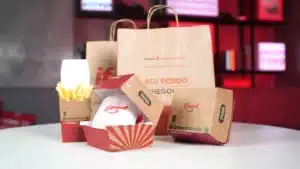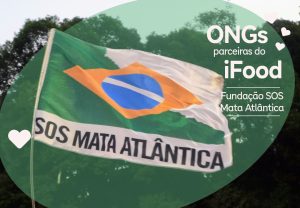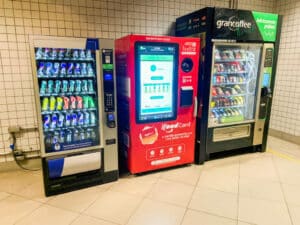Zeroing plastic pollution in its operations by 2025 is one of the pillars of iFood Regenerates, iFood’s positive environmental impact plan. To achieve this goal, the company has worked on different strategic fronts.
On the one hand, it created actions that reduce the use of plastic in deliveries, especially cutlery and straws. On the other hand, it has invested in partnerships to develop sustainable packaging and encourage the recycling chain — from consumers to cooperatives.
Do you want to know what these initiatives are? Discover, below, iFood's three strategic axes to eliminate plastic pollution in your delivery operation.
Reducing the shipping of plastic items
Since June 2021, the iFood app has given customers the option to do not need to send plastic forks, spoons, knives and straws when placing the order. This is an initiative of the “Friends of Nature” campaign, which seeks to reduce the consumption of single-use plastics and, thus, support the iFood Regenera goal of eliminate plastic pollution from deliveries by 2025.
And the results are already showing: since then, more than 200 million orders have been delivered without these single-use plastic items. Considering only the requests to which the consumer responds “I don’t need these items”, more than 510 tons of plastic are no longer circulating. The next steps of the initiative are focused on including the question about the need to send sachets of condiments in deliveries and developing ways to provide visibility in the app for “Friends of Nature” restaurants.
Encouraging the use of sustainable packaging
To reduce the sending of plastic packaging, the company has invested in partnerships to expand the range of sustainable options and increase the scale of these solutions on the market and, thus, reduce their final price.
One of them, with Suzano, aims to develop packaging for use in delivery, using plastic-free cardboard (100%, recyclable and biodegradable); another is with growPack, startup which produces compostable packaging from corn straw.
Current partnerships with the industry aim to find scalable and more affordable solutions, but since 2019, the iFood Shop now offers a sustainable packaging section, such as those from “Já Fui Mandioca”, which uses cassava starch to manufacture biopackaging that turns into fertilizer in up to 90 days, sugarcane packaging, among others.
In the coming years, iFood's focus will be on engaging large restaurant chains and small ones alike (these, through the packaging market place, iFood Shop) to adopt more sustainable packaging in their operations.
Investment in recycling
After reducing and replacing the use of plastic and packaging, it is time to encourage recycling. It is at this stage that the cycle of eliminating plastic pollution is completed, as it plans to recycle, in 2025, 100% of the volume of plastic that still circulates (that is, everything that has not been reduced or replaced). On the one hand, iFood helps people change their habits, both using the chatbot Recycle Bot to ask questions via WhatsApp how to implement voluntary delivery points (PEVs). Since 2021, 81 PEVs have been opened in three States —São Paulo, Rio de Janeiro and Bahia—, together, they recycle, on average, 400 tons of materials per month.
At the other end, the company promotes the recycling chain. One of iFood Regenera's initiatives is the recycling of thermal backpacks used by delivery partners. The program I've Been Bag collects those that are no longer in usable condition and, in partnership with GreenPlat and Retalhar, transforms this material into new products, such as bags and fanny packs, and even fuel for industry. Between 2020 and 2021, 124 tons of backpacks were recovered instead of going to landfill.
iFood is also investing in improving the recycling chain in cooperatives. In partnership with eureciclo, the company seeks optimize the operation of cooperatives in Rio Grande do Sul. An example is Coolabore, a cooperative in Novo Hamburgo, which promoted an increase of more than 40% in its recycled waste operation.
Finally, to all these actions, there is another initiative: in July 2021, the iFood adhered to the #DeLivreDePlástico commitment, organized by the United Nations Environment Program (UNEP), the main environmental authority in the United Nations (UN) system, and by Oceana, the largest non-profit non-governmental organization focused on protecting our oceans. For now, iFood is the only delivery company in Brazil to join the initiative.


